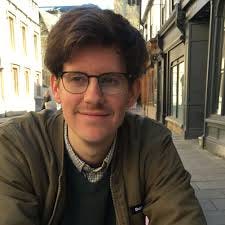"The way we think and what we think about forms us ..."
Prof. Connor Grubaugh reflects on undergraduate education, the intellectual life, and his own formation at BINST.
Thinking with the Berkeley Institute is a venue to share, engage and extend the conversations we’re having at the Berkeley Institute. Our post today takes stock of the long term consequences of these conversations; we understand their nature and their urgency in part by recognizing the way they shape individual lives. We’re excited to share a conversation below with Berkeley Institute Alum Connor Grubaugh on the role of the Berkeley Institute in his own intellectual formation. As with the support and engagement of so many of our alumni, Connor’s reflections in turn provide fodder for our continued discussion of how we think and why that matters.
Also, take note: we’re deep into our Fall 2024 Fundraising Campaign, with the goal of getting 30 new donors. We also have the opportunity to claim matching funds up to $30k for all new or increased donations by Dec. 17. Please consider supporting the work of the Berkeley Institute by making a contribution here today.
A conversation with BINST Alum, Connor Grubaugh:
What are you doing now?
I’m currently a postdoctoral fellow in the Civil Discourse Project at Duke University. Starting next summer, I’ll be an assistant professor in the School of Civic Life & Leadership at the University of North Carolina, Chapel Hill. My writing is focused on themes of temporality and hope in the history of political thought, but my teaching is more interdisciplinary. I’m looking forward to teaching a course on “America Through Foreign Eyes” this spring.
What are two stand-out memories of the Berkeley Institute?
I first encountered BI as an undergraduate history major in 2013, through an unlikely connection with BI alumna and now director, Dena Fehrenbacher. At the time I was struggling to figure out how the different pieces of my education fit together, and what purpose it all served. I also had questions about how to integrate what I was learning in the classroom with my religious commitments. There was less romance than frustration in this for me, and I did consider dropping out of the university, at least temporarily.
My fondest memories of BI are related to sorting out these problems. Steve Justice’s undergraduate colloquium confirmed me in my intuition that I was missing a big-picture account of the intellectual life and its ends. The colloquium was also the first place I was challenged give a justification for my intellectual pursuits, and receive criticism on it. The fact that I could do that, and we could reason about it together, was a revelation.
Something else BI did for me was point me toward texts and traditions that addressed my most pressing questions. I read Aristotle’s Ethics for the first time with Matt Rose. Working through Dante’s Purgatorio with Steve Justice was an experience I’ll always treasure. I was also given the opportunity to assist in this side of BI’s programming by co-facilitating seminars on late antiquity with Monica Mikhail and on Alasdair MacIntyre with Lara Buchak. It taught me that intellectual growth is a byproduct of seeking insight from others, then handing it on again.
How did the Berkeley Institute shape your intellectual, artistic, or professional work?
In too many ways to count, but I can mention one. Something Steve Justice always emphasized with us was the reflexive character of intellectual life: in thinking about an object, we are always already thinking about ourselves as subjects. The way we think and what we think about forms us into certain types of person. Accepting this doesn’t commit us to the kind of relativism that says we can never get to the truth because we can’t get outside our own heads. Instead, it reminds us that the whole truth is always found where subject and object meet.
I find this crucial to keep in mind as an academic. It’s so easy to get absorbed in the latest disciplinary research programs and make a living as a scholarly workhorse, executing a standard procedure with a predetermined script. What rescues you from this trap is looking up every once in awhile and asking, What am I really doing here? What’s the end I’m working toward, and what assumptions about myself am I making along the way? What sort of practices are implied by this approach to thinking, and who am I becoming by engaging in them?
What are you most excited to tell others about the work of the Berkeley Institute?
BI is a wonderful place to engage in genuine self-discovery. There is a lot of cheap talk in our society—especially around college campuses—about authenticity, which usually devolves into navel-gazing. But what you can do at BI, that you can’t do many other places, is ask the question of who you hope to become in a way that’s responsive to the reality of our nature as thinking beings.







